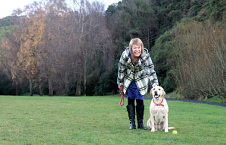Overview
There is growing interest in the potential of dog-walking to improve human health and wellbeing. Research is currently focused on improvements in physical fitness but dog-walking also helps mental wellbeing and social connectedness. It seems that strong emotional attachments between humans and dogs are linked to sustained walking.
Dog-walking stories from the field
 "My interest in dog-walking as a form of physical activity was inspired by the stories of patients and research participants. I embarked on a research journey which would lead to descriptions beyond those of physical fitness and exercise into the realm of therapeutic spaces that are created and re-shaped through the activity of dog-walking.
"My interest in dog-walking as a form of physical activity was inspired by the stories of patients and research participants. I embarked on a research journey which would lead to descriptions beyond those of physical fitness and exercise into the realm of therapeutic spaces that are created and re-shaped through the activity of dog-walking.
Participants have told me that they value the holistic well being that a shared walk with a canine friend can bring about and that they rarely think about the physical activity component. I have also observed how long-term health conditions and social policy can limit the well being of humans by restricting access for dogs. For example, a visit to the hospital can be daunting and the presence of a canine companion can boost confidence.
Physiotherapy aligns well to the study of movement and, the employment of mobile methods (audio-recordings, GoPro video-recordings and field observations) has allowed me to observe the real life movements and interactions that take place on a dog-walk. "
Dr Cath Smith (Project lead)
Publications
Smith CM, Treharne GJ, Tumilty S. (2017) “All those ingredients of the dog-walk”: The therapeutic spaces of dog-walking for people with long-term health conditions. Anthrozoos 2017, 30(2): 327-340. doi: 10.1080/08927936.2017.1311063.
Campbell, K., Smith, C.M., Tumilty, S., Cameron, C., Treharne, G.J. (2016) How does dog-walking influence perceptions of health and wellbeing in healthy adults? A qualitative dog-walk-along study. Anthrozoos
Coombs, S., Eberlein, A., Mantata, K., Turnhout, A., & Smith, C. M. (2015). Did dog ownership influence perceptions of adult health and well being during and following the Canterbury earthquakes? A qualitative study. Australasian Journal of Disaster & Trauma Studies, 19(2), 67-75.
Cameron, C., Smith, C.M., Tumilty, S., Treharne, G.J. (2014) The feasibility and acceptability of using Mobile Methods for capturing and analysing data about dog-walking and human health. The New Zealand Journal of Physiotherapy, 42 (2), 163-169.
Funding
2016 Physiotherapy Research Fund 'How does dog-walking influence health and wellbeing of people who 'borrow' dogs to walk?'
2013 University of Otago Research Grant 'Are Mobile Methods a feasible way to ask people with chronic conditions about dog-walking and health?'
News and events
September 2017. "The perfect dog walk" Cath and team's research has been profiled in the YourDog September edition. YourDog is a British publication with a wide distribution network.
18th November 2016 Public lecture Profs Sandy and Randolph Barker: Evidence supporting health benefits of human-canine interactions.
19 July 2016 Invited Speaker presentation to CeMoRe (Centre for Mobilities Research) and the Faculty of Health and Medicine, Lancaster University
31st May 2016 “All those ingredients of the walk”: The therapeutic spaces of dog-walking for people with long-term health conditions. CHARR seminar series
23 May 2016 Otago Daily Times 'Dog Days'
2 December 2015 'How does dog walking influence the health and well being of people with long-term conditions?' Dog-walk research information evening 2
9 December 2014 'How do dogs influence our health and well being? Dog-walk research evening 1
29 March 2014 Channel 39 News-nightly interview
27 March 2014. Otago Daily Times: Not just a walk in the park.
28 May 2013 'Going walkies good for well being' University of Otago Bulletin
Future studies
- Will include a combination of qualitative and quantitative data collection (such as GPS and dog-specific activity monitors).
- Exploring the concept of 'loaner dogs' to see if the therapeutic spaces created by dog-walking are accessible to those who live with a dog and those who do not.
- Examine how the built environment and social policy influence therapeutic spaces for dog-walking.
Research team
Academic team
 Dr Cath Smith (Project lead), Physiotherapy. Cath is the key contact for this project cath.smith@otago.ac.nz
Dr Cath Smith (Project lead), Physiotherapy. Cath is the key contact for this project cath.smith@otago.ac.nz
Dr Gareth Treharne, Department of Psychology
Dr Christina Ergler, Department of Geography
Community partners
Dog-walking research is supported by the Dog-walking Research Advisory Group. This group of dog advocacy organisations, dog-owners and academics provide invaluable support and guidance for projects within this programme.